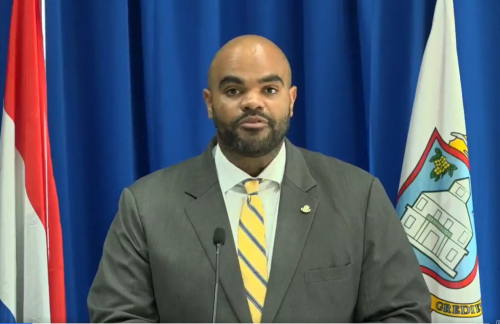 PHILIPSBURG:--- The Court of First Instance has issued two favorable judgments for the Ministry of Public Housing, Spatial Planning, Environment and Infrastructure (VROMI) concerning the Westview construction project, Minister Patrice Gumbs Jr. announced during today’s press briefing. The rulings, delivered on November 10th, uphold the construction freeze that the Ministry implemented earlier this year.
PHILIPSBURG:--- The Court of First Instance has issued two favorable judgments for the Ministry of Public Housing, Spatial Planning, Environment and Infrastructure (VROMI) concerning the Westview construction project, Minister Patrice Gumbs Jr. announced during today’s press briefing. The rulings, delivered on November 10th, uphold the construction freeze that the Ministry implemented earlier this year.
The developer of the Westview project had challenged the Ministry's decision to halt construction, seeking to have the freeze overturned. However, the court affirmed the Ministry's authority to enforce its regulations.
A central point of the verdict was the distinction between building permits and civil works permits for excavation. Minister Gumbs explained that the court dismissed the developer's claim that a building permit implicitly includes permission for excavation. "The claimant's argument that the required permission is implicitly part of the issued building permit cannot be accepted," Gumbs said, quoting the court's decision. He emphasized the verdict clarifies that these are separate requirements, a point of confusion for many developers. "Since taking office, a number of people have come to me explaining that because they have a building permit, they automatically have a civil works permit, and that is not indeed the case," he added.
The court also addressed the developer's argument that the government was unfairly targeting their project, a claim of unequal treatment. The verdict noted that the Ministry of VROMI acknowledged historical inconsistencies in enforcing excavation permits and is now prioritizing large construction projects to improve the process. The court found no basis for the claim of arbitrary enforcement, stating that "the claimants have not sufficiently demonstrated that they were treated unequally compared to similar cases."Crucially, the court stated that past governmental errors do not obligate the Ministry to continue them. "The principle of equality does not extend so far as a defendant is obliged to keep repeating mistakes once made," Gumbs quoted from the verdict.
Minister Gumbs framed the ruling as a pivotal moment for establishing proper regulatory procedures and advancing sustainable development on the island. He acknowledged the difficulty of implementing change but stressed its necessity. "We can't want to go to heaven but not die," he stated. "In short, we cannot want a high quality of life and not make necessary changes to make it happen."
The Minister concluded by reaffirming his commitment to helping all developers uphold building standards and regulations as St. Martin moves toward a more sustainable future.